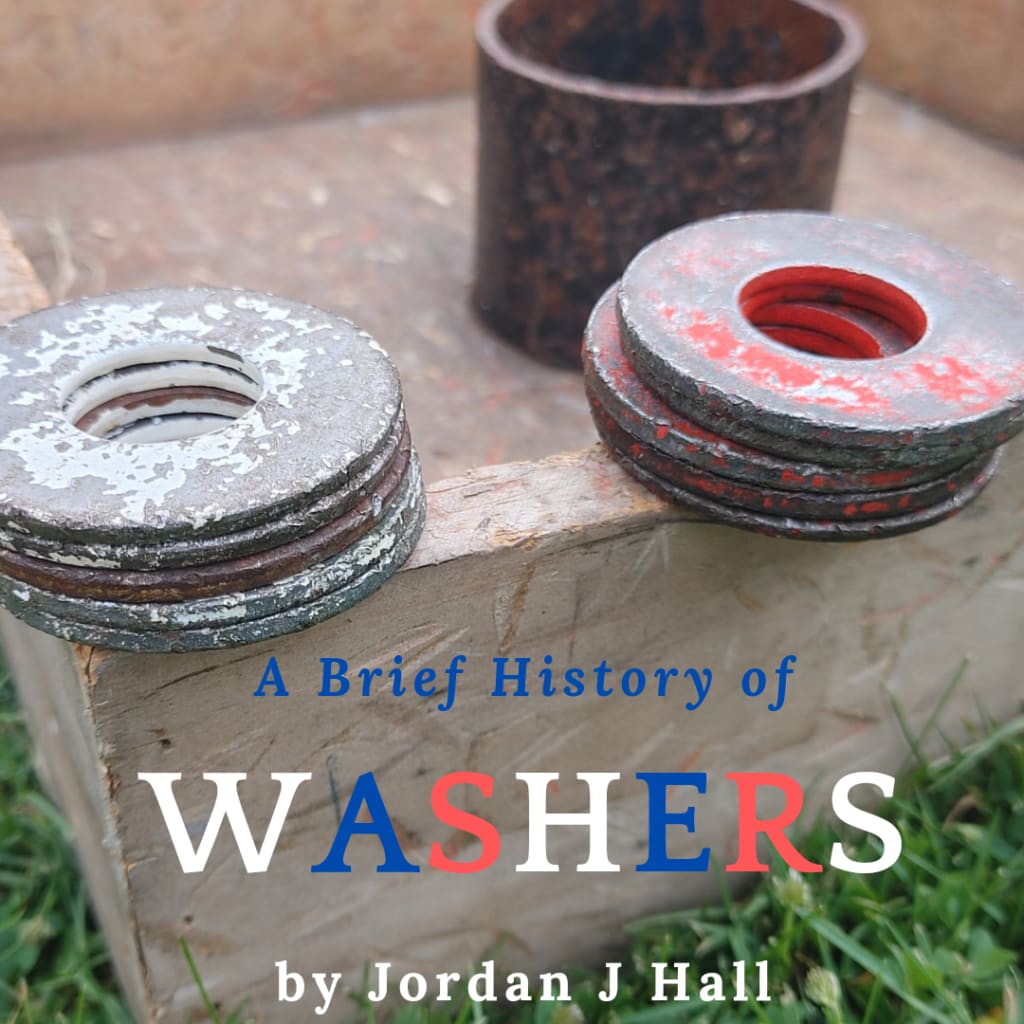A Brief History of Washers
America's Oldest and Newest Pastime

Enjoy this false history of a real game:)
Beginning in 1863 the gentle contest of Washers lit its journey to existence. From inception as a tool of destruction in the Civil War, through its success at the 1904 World’s Fair, to the grassroots fervor of today, its path to the hearts of Americans has come in many defiant ways. Whether you learned first-hand from an uncle or played the game independent of your town rules, the institution of Washers has enveloped millions of stalwarts through the years.
Humble Beginnings
Washers’ roots lie in the stratagems and sabotage of the American Civil War where desperation met with innovation to create the game of washers we play today. Pound for pound, there was no more destructive force in the war than washers. It only happened a few times, but when a locomotive explodes on a track, it cripples an army. Supply lines are down for weeks, meaning no food for hungry troops, and no bullets for thirsty guns. The magnitude of a washer strike resonated with soldiers hundreds of miles away. Concern grows in the officer’s camp when they find no telltale sign of an attack.
A brilliant exploit of design weakness, it was a force too simple not to use. Using a small, inane object towards destruction was not unheard of in warfare, but the use of said device that goes on to acclaim is nothing short of amazing. Using the metal disks to plug a steam engine’s stack box is a ruthless form of attack. So much so, it was not sanctioned by the military at the time, nor was it perpetrated by an officer. It was a pair of ragtag infantrymen that exploited a shared history.
The Original Odd Couple
Arthur Roebling of Tennessee, and Brigid Antoponi of Ohio, were Union soldiers that trained in the basics of warfare. Before the more formal interactions of war were pushed upon them, their shared love of horseshoes brought them together. Despite being opposites in most regards the pair found a common language within pitching games. Taking those tenants, they morphed them into a weapon so devastating it could strand a regiment for weeks.
Arthur was a quiet, mischievous teen who had lived in the town of Malton, TN all his life. It broke his heart when his home state became the last to secede from the Union and was crestfallen when the Confederate army chased the state loyalists away and overran his small burg. Arthur fumed at the insults from the soldiers, his anger looked for ways to release, he wanted to use it to hurt the opposition. Arthur’s father had shown the boy the whole of the railyard and the platform. While staring at the smokestack of the 466 locomotive, Arthur’s father shared a secret with him that would change the course of the war. One could blow up a steam engine without a bomb.
Too nervous to confide such schemes to his commanding officer, Arthur enlisted his friend Bridgid Antoponi. Brigid was loud, yet careful, a rooster if ever there was one is human form. Deft in most physical ploys, Brigid was a natural with witticisms of the day and used them hamper his foes (in and out of the horseshoe pitch). Together they agreed that flat discs were the best device for the task (large ‘cut washers’ being prevalent). Making homespun replicas of locomotive's stack box, Brigid and Arthur drilled when they could. A large box with the canister in the center was a good model for practice.
Arthur also shared drawings of what the Malton station looked like They would stand on the top of the embankment, putting them level with the stack. Each soldier would have a few shots at the target while groundlings would be loading on the boiler, tinder and cargo. It was rainy night and August when they would finally lay siege.
The Ghost and the Darkness
Risking court martial, the pair of soldiers left their camp in Ohio and made for the valley swamp of Malton, Tennessee. They stole horses and rode for hours before abandoning the mares to finished on foot.
Thankfully, the pitter-patter of the rain helped to dampen the sounds of ricocheting discs. Less clatter was good news, but the rain would be difficult to contend with. There was no concrete way to determine via sight if either managed to get a washer in the hold, but the telltale clugga-clugga of the pipe as the washer descends was the sound they had not heard until this night. Tingling their spines, the tone rang through them, they wanted to hear it again.
Eight minutes was all they had before the locomotive sped off again. It would be another hour before the smoke box was unable to handle the added pressure and explode. Its blast would be felt by Arthur and Bridged as they walked home through the forest in a drizzle. They shared a look of awe and concern for what they had caused.
Wildfire
Word got round about the attack on a rail line, rumors as to what caused the destruction were everywhere. Brigid could not keep the success to himself, he bragged about the genius of Arthur to a few of his pals. Before long Arthur and Brigid were brought before military court and the pair divulged their malfeasance. Instead of discharge, they got a promotion. Their new task would be going from camp to camp, training as many washer duos as possible.
Including the Malton attack, there were only a few recorded washer strikes. By the time Authur and Brigid made it to a dozen camps to train washer duos, the courthouse in Appomattox was welcoming its most famous duo, Robert E. Lee and Ulysses S. Grant. As quickly as it started the military use for washers disappeared, Scandalous at birth, washers would fade into a pitching game. with each region or backyard molding what they had available for the game. This horizontal leadership approach led to a wide set of rules that differed from town to town.
Washers’ homespun nature is reflected in its nomenclature and gamesmanship. Some zip codes varied the number of washers pitched, players, scoring, naming, etc. Nearly every facet of the game was affected by this expansion, and it wasn't until the 1904 World's Fair in St. Louis, Missouri that rules were codified. (Even now, home rules outweigh any ‘official rule’, as long as it is stated before play).
Transitions
In the 40 years between the Civil War and the 1904 World's Fair in St. Louis, washers decentralized itself becoming as varied as the places from which the soldiers hailed. Town to town, region to region, even house to house, the rules of washers was open to interpretation. Anywhere from two to five washers would be used in most pitches, with some full-shoe games allowing 10 washers to toss.
With names like Polish Horseshoes, Ditch Pitch and the like, the game of washers did not find official platforms aside from a smattering of town events and county fairs. Leisure time was a new commodity, thanks to the Industrial Revolution during Reconstruction in America. Lawn games like washers were being lifting into existence by tugging at the hearts of any who picked up a disc.
Unlike other sports being developed at the time, washers asked participants not to focus on strength, speed, or size, but on patience, aim, and tact. Baseball, football, basketball etc. require advanced and robust physical form, thus limiting the participants. Thanks in large part to its gentility, washers made itself available to a wide array of audiences.
Solitary all the way to Tournament, the game of washers is thrilling. Singles matches are the most dominant way to play, given only two souls are needed to be present, but it is a Doubles Tournament that really gets the juices flowing. As the box is assaulted, and the pipe often rung, the crowd and players cannot help being taken up in the roller coaster of emotions that is washers. For decades the game sprawled itself about the swiftly expanding country, morphing to an institution in some places. Bragging rights of top washer players held more weight than elected officials in some townships. Anyone who was anyone needed to understand the game and the washer pitch became the golf course of yesteryear. All this focus on washers created a common question, who was the best scudff on the planet? In 1904 contenders from across the land were called to St. Louis to claim once and for all the best washer player in the world.
The Greatest Contest the World Has Ever Seen
Edward Gardener Lewis was a publisher, entrepreneur, and all-around hustler. His exploits during the 1904 world's fair put the game of washers on international footing. Lewis sponsored a washer contest at the fair and used his established reach as a magazine publisher to promote it. E.G. understood the grassroots admiration for the sport and hoped to cash in twice, as he also managed a 6,000 bed Camp Lewis near the fairgrounds, perfect for a week’s stay of a family... E.G. Lewis’ contentious relationship with fair president, David R. Francis, would diminish the official standing of the washer contest, but it could not deny the amazing levels of tenacity a prize of 6 million nickels would spur in the populace.
Limited official documents remain from the contest, we have only the naming systems and rules of play. As mentioned, the rules of the game varied widely, and the contest board needed a way to ensure a codified set of parameters were known and followed. Thousands upon thousands of signatures were turned in, (mandatory to enter the contest), the rules can be found in the latter part of this document. {Also in appendices, you will find variations of play, feel free to add your own.} All players were required to pay a 5-cent entry fee along with the waiver certifying you had read the rules. Then, as it is now, few read the fine print, before signing it and caught more than a few players off guard.
As bright as the peak was for washers, due to several reasons the contest went bust and E.G. Lewis was held in suspicion. Lewis’ numerous projects like establishing new cities in both Missouri and California and his circulation of 4 million readers left little time to concern himself with a washer contest that was losing money. What would have been ruin for most men was barely a hiccup for the compulsive businessman, and he passed the faux pas onto an underling. At the culmination of the event, contestants were furious to find fees on prize money they had won. Again, victims of not reading the fine print.
E.G. left for California, and washers went back to the hills, the brick towns and the backyards. This time with a more cohesive set of rules, but with the same chip on its shoulder. The rough, yet elegant game of washers lives on, with your help it will last another season. Read on to find directions on how to make your own washer set and the rules for gaming. The season is upon us, get washering!
Read Next: Washers; Rules, Regulations, & Nomenclature
About the Creator
Jordan J Hall
I write Historical and Speculative Flash Fiction. Nature and society's underbelly are the focus of my work. Read my debut collection of short stories, Mammoth, Massachusetts and check out jordanjhall.com for more.






Comments
There are no comments for this story
Be the first to respond and start the conversation.